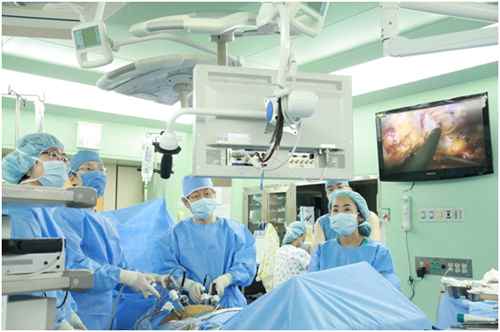Clostridium Difficile That Causes Hospital Infections Is Fast Evolving Into A Disinfectant-Resistant Superbug
Source: Thailand Medical News Jul 13, 2019 5 years, 9 months, 1 week, 6 days, 12 hours, 17 minutes ago
A new research by in The Department of Molecular Microbiology at University of Plymouth, has shown that the C. difficile bacteria strain that is found in all hospitals around the world and causes infections to patients, is fast evolving and developing resistance to all known disinfectants coupled with the fact that is also now mutating, multiplying and spreading at faster speeds in whatever conditions than before. The research is published in Applied and Environmental Microbiology, a journal of the American Society for Microbiology.

The Studies showed that surgical gowns and stainless steel remained contaminated with the pathogen
Clostridium difficile even after being treated with the recommended disinfectant and also with other alternatives. In an interview with Thailand Medical News, principal investigator Dr. Tina Joshi commented,”The spores of the bacteria were able to grow after decontamination. This shows that spores are becoming resistant and we need to reconsider how we decontaminate and employ hygiene measures in hospitals. The motivation for the research was a case in an American hospital in which gowns were suspected of contributing to transmission of
C. difficile. The gowns were found to be contaminated with the deadly 027 strain of
C. difficile.”
C. difficile infects roughly about 16 million patients annually, killing about 600,000 globally. New strains are responsible for hard-to-treat cases of severe illness. Symptoms can range from diarrhea to fever, rapid heartbeat, inflammation of the intestines, and kidney failure. Normally, older patients are more vulnerable and also those in long-term care facilities.
The team studied the ability of
C. difficile to adhere to, and subsequently transfer from hospital surgical gowns, by applying spores in sterilized water, at a concentration of 1 million per ml, directly to the surgical gowns in liquid for 10 seconds, 30 seconds, 1 minute, 5 minutes, and 10 minutes before being removed and discarded.That methodology was designed to mimic transfer of infectious bodily fluids in the hospital settings in order to assess the potential for transmission to patients.The numbers of spores recovered from gowns did not increase with contact time, suggesting that the spore transfer between surfaces occurred within the first 10 seconds of contact.
The single use gowns were ineffective at trapping spores within their fibers and preventing the onward transmission of spores as demonstrated by spore recovery from the gowns, according to the team. (This highlights the importance of ensuring that single-use surgical isolation gowns are used appropriately in infection prevention and control. Personnel are to don the gowns upon entering and dispose of them when exiting a single room to prevent spore transmission and incidence of
C. difficile infection.)
The gowns even after being treated with disinfectant containing 1,000 ppm chlorine for 10 minutes, failed to clear the gowns of
C. difficile, showing that the gowns can pick up and retain the spores.The spores on stainless steel and vinyl flooring also remained viable after treatment with the disinfectant Alternative disinfectants also showed the same results.
This results called for healthcare authorities, hospitals and resear
chers to reconsider how much biocide to use and to ensure infection control is standardized. It also called for new biocides research and also putting into place more cautions and alerts about the results of this study. This could then be used to formulate future guidelines on infection control and biocides.
